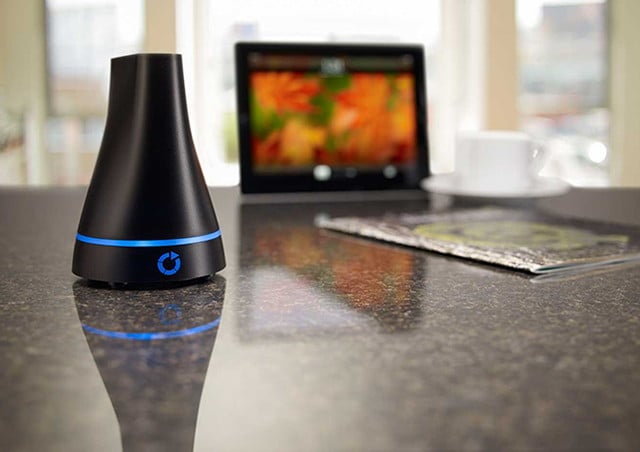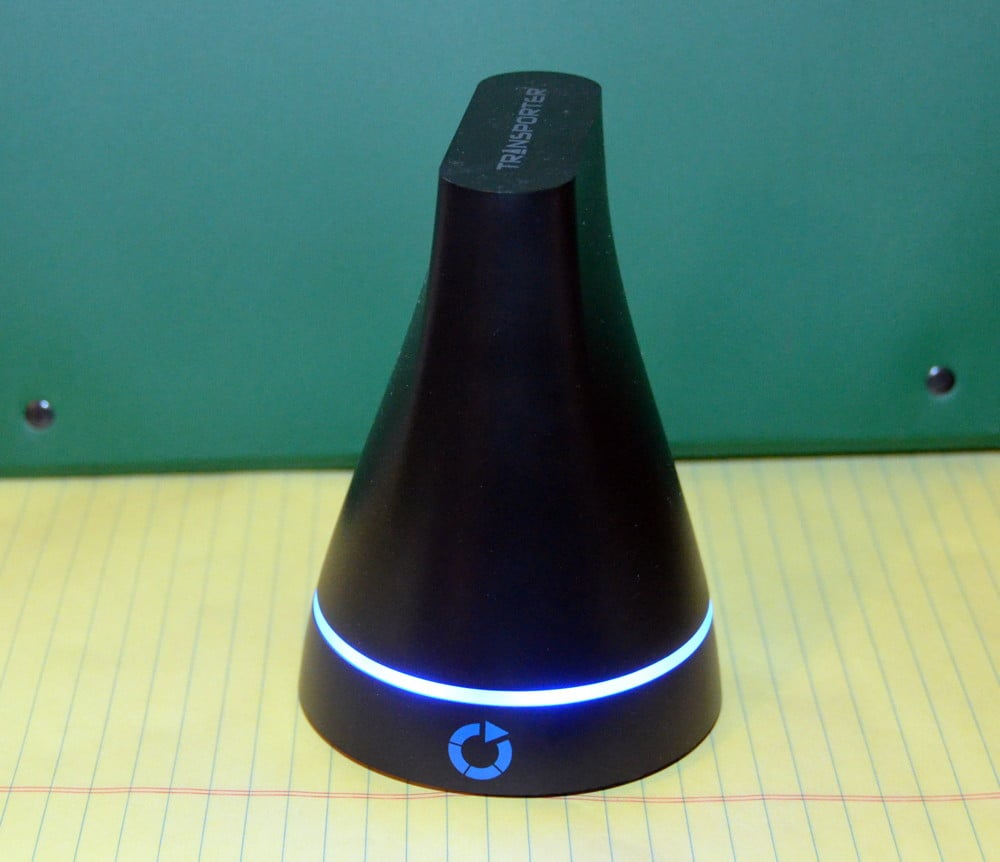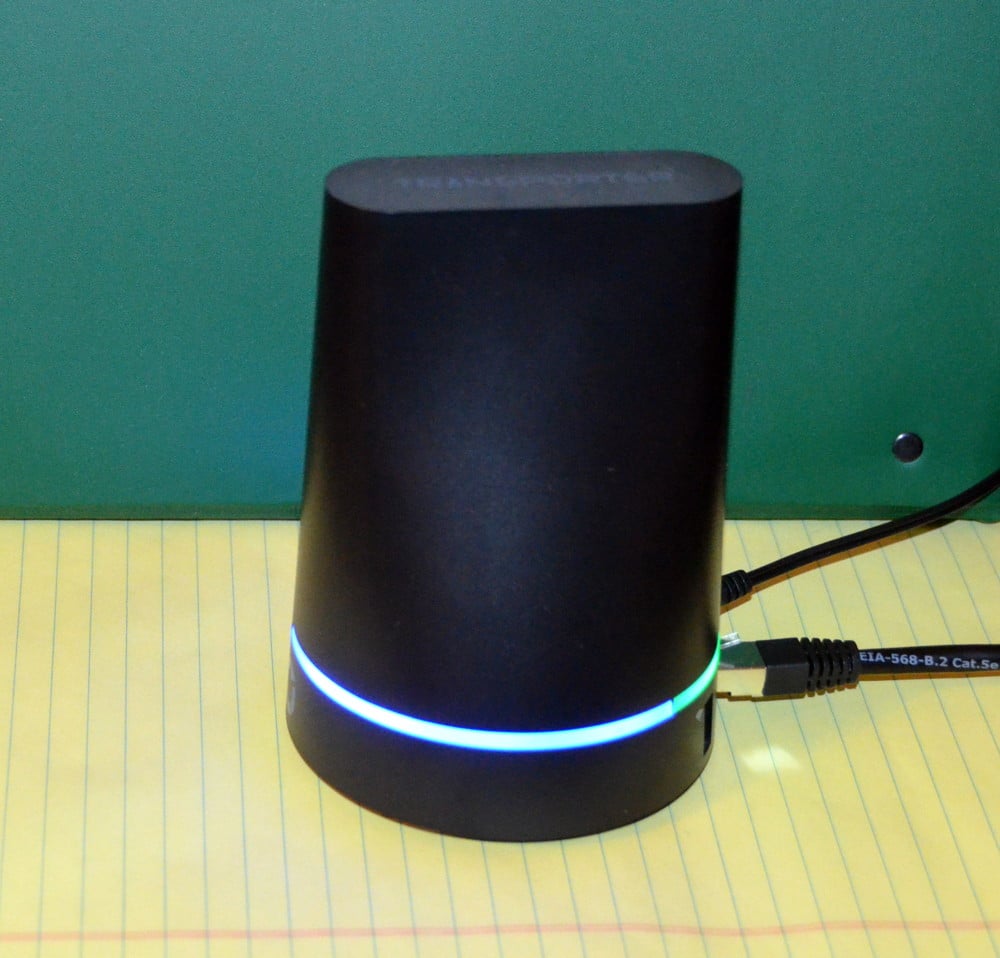I am excited to welcome Connected Data as a new sponsor of iPhone J.D. The company has come up with a fantastic new product — the Transporter — that attorneys are going to love. It provides online file storage that is mirrored locally on your computers. Sounds like Dropbox, right? But unlike Dropbox, you own the server hardware so your files are 100% secure without your confidential documents being in the possession of a third party, and the product is designed from the ground up to make sharing and backup easy.
The Transporter itself is a well-designed and functional piece of hardware, which comes as no surprise if you are familiar with the Drobo, a popular storage device that was developed by many people who now work for Connected Data including its CEO. It has a unique, cone-like shape. It is about 5 1/2 inches tall and about 4 inches in diameter, so it doesn’t take up much space. The Transporter comes with an ethernet cord to connect it directly to your network, or you can get an optional wireless adapter. At my house, I use an Apple AirPort Extreme Base Station to provide Wi-Fi, and so I simply plugged the Transporter into an Ethernet port.

The Transporter has a lit band surrounding it. You can dim or turn it off if you find it distracting, but the light provides you with status information. For example, the band is solid blue when idle, pulsating blue when transferring data, pulsating yellow if disk space is low (or red if the disk is full), flashing red to yellow if there is no Internet connection, etc.

Installing the software on either a Mac or PC is simple. Once
installed, you will see a folder on your computer called Connected Data
to which you can drag your files. It comes with default sub-folders
such as “Documents,” “Photos” and “Home Movies” but you can create your
own folders and rename those if you want. Files copied to one of your
Connected Data folders are then copied over to the Transporter itself.
For example, at my office I can use my PC to create a folder called “Smith v Jones” and move over my files — correspondence, pleadings, research, etc. A local copy of those files remains on my PC for fast access, but the files are also encrypted and then stored on the Transporter that is connected to my home network. On my home computer, a “Smith v Jones” folder is created with all of the files copied over to it, so anything that I am working on at my office will be there at home if I need to access it later.

As I noted before, this sounds a lot like Dropbox, which is a compliment because Dropbox is great. But the Transporter offers several advantages over Dropbox.
First, the Transporter is secure. I only use my Dropbox to store “public” documents such as pleadings because you just never know what is going to happen to confidential documents in the possession of a third party. But with the Transporter, you own the hardware on which your files are stored, so you can feel comfortable putting your confidential attorney-client and work product documents there. Documents are sent from your computer to the Transporter using industry-standard AES 256-bit Secure Sockets Layer (SSL) encryption. You can manage your Transporter(s) via the Connected Data website, but Connected Data does not see the contents of any of your files. Your files are not located on any of the Connected Data servers, but instead stay on your Transporter hardware.
Second, the Transporter gives you more space at less cost. Dropbox provides you with 2GB for free, or you can pay $99 a year for 100 GB, $199 a year for 200 GB or $499 a year for 500 GB. And you need to keep paying, month after month, year after year. With the Transporter, you just buy the hardware once and there are no subscription fees. You can get a Transporter with 1 TB of space for only $299, 2 TB of space for $399, or you can even get a $199 Transporter with no hard drive so that you can choose a 2.5" SATA hard drive from whatever drive manufacturer you trust the most.
Third, the Transporter lets you easily add more storage, either by upgrading to a larger hard drive, or by buying an additional Transporter.
Fourth, you can decide what files to store locally and what files to store on the Transporter. With Dropbox, you have a local copy of every file in your Dropbox, which is fine if you are using a free 2GB Dropbox or perhaps the 100GB Dropbox, but if you go larger it takes up a lot of space on your local drive. With the Transporter, you can choose to have certain folders synced locally for faster access and keep other folders only on the Transporter so that they don’t take up space on your hard drive. The default setting is that the Transporter will keep local copies on your computer of folders that are less than 10 GB, a setting that seems reasonable to me so I haven’t changed it, but you can adjust that as you like. And as noted, you can also explicitly state that certain folders should or should not be stored on your local drive. If you use a computer that does not have much drive space, such as a MacBook Air or other computer with an SSD drive, you can tweak the settings as appropriate.
Fifth, you can use multiple Transporters to create backups. You can share a folder with someone else who has a Transporter and a copy of the folder will be kept on his Transporter as well. Or, you can buy an additional Transporter and choose to share a folder with that Transporter. For example, you can keep one Transporter connected to the network in your main office and another Transporter connected to the network in a satellite office. Tell the Transporter software to copy some or all of your folders to that second device, and that way even if there is a disaster at your main office and both your computer and the first Transporter are destroyed, you still have a copy of your folders on the Transporter at your satellite office. Thus, Transporter offers you the same off-site backup security that you get by paying for an account with a company like Backblaze or Carbonite.
Many attorneys like to use Dropbox because it makes it easy to share files and folders. The Transporter also does a great job with sharing files with others, whether they are in your office or around the world. You can give one other person, or a team of people, access to folders on your Transporter, and they can access and work on files on that folder but they won’t have access to other folders. Likewise, someone else can give you access to a folder on their Transporter, and the contents show up in your own Connected Data folder. So you can either use one Transporter for your entire team (or perhaps even your entire office), or you can use multiple Transporters with different people having access to different folders.
I should note that the Transporter handles local files a little
differently than Dropbox. With Dropbox, you see a folder on your hard
drive that contains your Dropbox files. If you drag a file from your
desktop to your Dropbox folder, the file is moved from the desktop to
the folder. The local Transporter folder works like a virtual external hard
drive, so if you drag a file from your desktop, the original file stays on your desktop and a copy is placed in your Transporter folder on your computer. (And then that file is encrypted and stored on the Transporter hardware.) For people who share a lot of folders, this is a safety feature because someone else with access to one of your Transporter folders has the ability to delete a file, and if they do so you might want to go back and get the original file. But right now, I only have a few shared folders and I am mostly using the Transporter to sync folders between my work and home computer, so I have been moving files to the trash after I put a copy in a Transporter folder.
The Transporter is still a new product. Last year, it was the subject of a successful Kickstarter campaign, and the company just started shipping Transporters in February of 2013. The company sent me a free review unit so that I could try out the product in advance of this sponsorship, and I just received a second free review unit so that I can test using one Transporter to store backup copies of folders. (One thing that every attorney in New Orleans learned during Hurricane Katrina is the importance of off-site backup.) While the software on my PC and my Mac works great, the iPhone/iPad app is still in beta testing and should be ready in a few weeks. Once the app is available and I have tried it out, I’ll post about my experiences. For anyone like me who depends upon access to files on an iPad, that app is a critical part of the usefulness of the Transporter.
But even though this product is new, I am very excited about it. In my one week of testing so far, it has worked great, and once the iOS app is released, the Transporter may well change the way that I work with files. Transporter offers the advantages of traditional cloud storage while offering much more storage at much less cost, provides the enhanced security of an external hard drive in your locked office, and allows you to use additional Transporters to get the same protection that you would otherwise have to pay for on a monhtly basis with an off-site storage company.
Thanks again to Connected Data for sponsoring iPhone J.D. this month, and kudos for coming up with such a useful product.
Click here to get Transporter from Connected Data ($199 – $399).
Click here to get Transporter from Amazon ($299 for 1TB or $399 for 2TB).


Very interesting. I use the pogo plug. Seems to have some advantages and disadvantages compared to this device.
What about syncing deletes and edits?
It works just like Dropbox. Delete a file on one computer, and it deletes it from the Transporter and any other synced computers. Edit a file on one computer, and then when you go to another computer that is syncing to that same Transporter folder and all of the edits are there.
How does this differ from say the Seagate GoFlex Home which is a network storage device?
The hardware is similar I suppose. It is the software that makes this different, making it easy to share select folders with full encryption, the ability to use multiple devices for backup and redundancy, etc.
I really like this concept, since I’m too nervous about Dropbox’s security (or lack thereof) to store any really sensitive documents there. Unfortunately, I think the price point is a little high for the average user, maybe by about $100 for each of the versions. Maybe I’m just too cheap. I could see it being great for small businesses, though.
Jeff, if I move my Transporter to my new home, will I still be able to access those files? It will be on a new network (new router, etc.).
I haven’t tried that, but I believe yes. In fact, if you are setting up a second Transporter to serve as a backup to your first one, one of the hints is to start with them both on the same network, so the first backup with a fast local Ethernet connection, and then move the second Transporter to the remote location where it will make future updates to just the files that are changed.
My concern was that someone could walk off with (steal) one of the devices and the data. I was told by someone at Connected Data that if you pull one transporter from one location (home / office etc) and then plug it at another location, the data will be erased when it detects a different IP address other than the one that was used during the initial set-up. So I am not sure about the hint you gave rsoules? Perhaps you could clarify? Thanks.
You can move a Transporter from one network to another network — such as from your home to your office or from one office to another one. That works fine. What you cannot do is remove a hard drive from a Transporter and try to read the hard drive using a different Transporter. The second Transporter will erase and reformat the hard drive. The idea is that a thief cannot access the data on your Transporter because he lacks access privileges, and that is true whether he access the Transporter on your own network or picks up the Transporter and moves it to his network. Moreover, if a thief were to yank out the hard drive and try to access it via a Transporter unit owned by the thief, that wouldn’t work either.
Jeff this sounds very interesting , I use dropbox ,I am all mac at home and PC at the office. I like dropbox as I can use it on my Ipad,
What I like about this is that you have the option with transporter to store sensitive information. It does have a high price tag though
I own two Transporters and they are great, until you realized that you cannot do any file/folder search with Mac OS Spotlight or Houdaspot. I used to be able to search files using Houdaspot, but this got broken with their latest v2.0 software. I contacted tech support and they confirmed that you cannot search for files and they didn’t think that was an issue. For me, I think it’s ridiculous that you cannot search. For now, I went back to Dropbox and I have two useless Transporters, Bad investment!
Bud James
Update on searching. If you use Transporter Library which keeps the files only on the Transporter’s drive and not locally, Spotlight does not work.
I have discovered a free utility from DevonThink called EasyFind. This is a standalone application that must be fired up to search, but it does successfully search the Transporter Library. It’s not as elegant as OS integration like Spotlight, but it’s a workaround for now.
Now that Transporter offers a device that you can attached external storage for capacity greater than 2TB, the inability to search is just plan dumb. What’s the advantage of huge offline storage if you have to hunt and peck through folders to find you stuff.
Hopefully, Drobo will fix the problem to make their devices worthy of the hype that they are a better solution than Dropbox. At the moment, they are not.
Regards,
Bud James